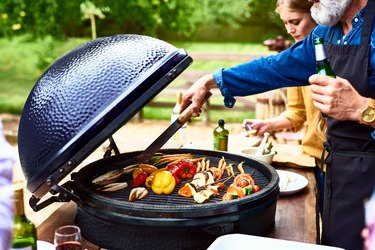
If you're making an effort to eat more vegetables every day, you deserve a pat on the back. Only 9 percent of American adults are getting the recommended amount of vegetables per day (between 2.5 and 3.5 cups), according to the Centers for Disease Control and Prevention (CDC).
And piling more veggies on your plate comes with a heaping of health benefits including a reduced risk of cardiovascular disease, type 2 diabetes, some cancers and obesity, per the CDC. But if you want to get the biggest nutritional bang for your veggie buck, how you prep and cook your vegetables matters a lot.
Video of the Day
Video of the Day
Here, Frances Largeman-Roth, RDN, author of Smoothies & Juices: Prevention Healing Kitchen: 100+ Delicious Recipes for Optimal Wellness, shares common cooking mistakes that make your veggies less healthy. Plus, she offers helpful cooking tips to keep your health goals on track.
Related Reading
1. You Boil Your Vegetables
If you're trying to avoid the extra fats used in frying, you might prefer to boil your veggies. But this method can minimize their nutritional value.
"Many of the water-soluble vitamins, like vitamin C and B vitamins, will leach into the water," Largeman-Roth says. "So unless you're going to make a soup, it's better to roast, bake, broil or microwave your vegetables," she explains.
2. You Only Use Coconut Oil
"Coconut oil is great for certain things, like making vegan desserts and sauces, but you don't need to use it for cooking vegetables," Largeman-Roth says. "Coconut oil adds far too much saturated fat to your dish" and can be particularly problematic for your health if it's your go-to cooking oil, she adds.
Again, "extra virgin olive oil is the healthiest cooking oil out there," Largeman-Roth says.
3. You Dress Veggies in Butter
While delicious, a tablespoon of butter adds an extra 100 calories and 11 grams of fat to your heart-healthy veggies, Largeman-Roth says. Plus, "if you drench your veggies in butter, you may not be appreciating the true flavor of your vegetables," she adds.
Instead, try drizzling with oil olive for a ton of flavor and heart-healthy fats.
4. You Sautee With Too Much Oil
Still, don't overindulge in the oil department. While olive oil offers heart-healthy benefits, it does contain a lot of calories and should be enjoyed in moderation.
"Start with 1 tablespoon of extra virgin olive oil for a pan of vegetables and toss to coat. And if they still look a bit naked, you can add more," Largeman-Roth says. Remember, "veggies shouldn't be slick with oil, just lightly coated," she adds.
5. You Use Too Much Salt
Some folks add salt to veggies before cooking and before eating. But this double dose of salt might be sabotaging your heart health.
"Veggies are a wonderful source of potassium, which helps to counteract the effects of sodium, so if you're loading your veggies up with salt, it's working against those heart-healthy efforts," Largeman-Roth explains.
Instead, "lightly salt vegetables before roasting, then taste them before adding any more," she says. Also, you can enlist other herbs and spices (think: garlic) that pack a ton of flavor.
6. You Char Your Vegetables
While you might enjoy that charred, smoky flavor, this cooking method might have serious downsides for your health.
"When you cook meat at high heat, such as on the grill, heterocyclic amines [chemicals that are linked to an increased risk of cancer] can form," Largeman-Roth says. "This doesn't happen with vegetables, but you still don't want to burn your vegetables because other carcinogens — such as benzopyrene — can form," she explains, citing a November 2012 International Journal of Environmental Research and Public Health study.
One way to combat this is by using indirect heat when you grill, Largeman-Roth says. "Indirect heat is the less intense heat that you get when you put items farther away from the flame." So instead of tossing your veggies straight in the fire, place them on the top rack of the grill.
Cooking your veggies for less time is also a safer strategy, Largeman-Roth adds.
Related Reading
7. You Only Use Pre-Cut Veggies
Who doesn't love pre-cut veggies? They're convenient, save time and help people throw together healthy meals quickly. Unfortunately, pre-cut veggies can also lose essential nutrients if they've been sitting on the shelf at the store for too long, Largeman-Roth says.
So, here's what you can do: "Try to incorporate whole leafy greens like kale and mustard greens in addition to pre-cut and pre-washed vegetables to ensure that you have your bases covered," Largeman-Roth says. Also, you'll want to eat them within five or six days — before the vitamin levels drop off, per the Cleveland Clinic.
Still, the Most Important Thing Is to Just Eat Veggies
No matter how it's cooked, eating any vegetable is better than eating none at all. "I don't want to discourage anyone from eating veggies — ever," Largeman-Roth says.
"So if the only way you and your family can enjoy broccoli is with a cheese sauce, that's totally fine," Largeman-Roth says. "You're still getting the benefits of the broccoli — just keep in mind that you're also getting extra calories and sodium from the sauce."
"Plus, you do need some fat to absorb the fat-soluble vitamins A, D, E and K," she adds. So enjoying your broccoli with some cheese sauce isn't a completely bad idea.
- Centers for Disease Control and Prevention: “Only 1 in 10 Adults Get Enough Fruits or Vegetables”
- International Journal of Environmental Research and Public Health: "Evaluation of Benzo[a]pyrene in Food from China by High-Performance Liquid Chromatography-Fluorescence Detection"
- Cleveland Clinic: "7 Tips for Getting the Most Nutrition from Bagged and Pre-Cut Veggies"
Was this article helpful?
150 Characters Max
0/150
Thank you for sharing!
Thank you for your feedback!